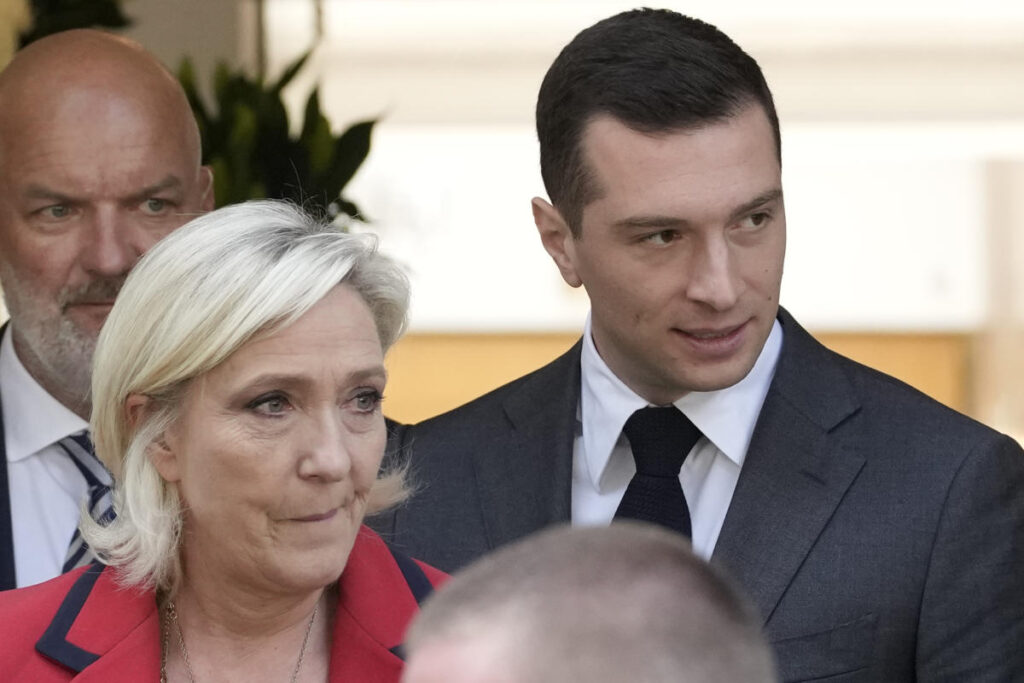PARIS (AP) — Voting began in France on Sunday in a crucial second round of elections that could deliver a historic victory for Marine Le Pen’s party leader. far-right National Rally and his inward-looking, anti-immigration views — or a gridlocked parliament and years of political deadlock.
French President Emmanuel Macron took a huge risk by dissolving parliament and calling new elections after his centrists suffered a landslide defeat in the June 9 European elections.
The early elections in this nuclear-armed country will have an impact the war in Ukraineglobal diplomacy and Europe’s economic stability, and are almost certain to undermine President Emmanuel Macron’s performance for the remaining three years of his presidency.
The first round on June 30 produced the biggest gain ever for the anti-immigration, nationalist Rassemblement National, led by Marine Le Pen.
Sunday’s vote will determine which party controls the National Assembly and who becomes prime minister. If support for Macron’s fragile centrist majority continues to erode, he will be forced to share power with parties that oppose most of his pro-business, pro-European Union policies.
Racism and anti-Semitism have marred the election campaign, together with Russian cyber campaignsand more than 50 candidates reported being physically attacked — highly unusual for France. The government is deploying 30,000 police officers on election day.
The heightened tensions come as France celebrates a very special summer: Paris is set to embark on exceptionally ambitious Olympicsthe national football team reached the semi-final of the 2024 European Championship championship, and the Tour de France runs through the country with the Olympic torch.
Meanwhile, 49 million voters are busy with the most important elections in decades.
France could have its first far-right government since the Nazi occupation of World War II if Rassemblement National wins an outright majority and its 28-year-old leader Jordan Bardella becomes prime minister. The party emerged victorious in the first round of voting last week, followed by a coalition of center-left, hard-left and green parties, and Macron’s centrist alliance.
The The outcome remains very uncertain. Polls between the two rounds suggest the National Rally could win the most seats in the 577-seat National Assembly, but fall short of the 289 seats needed for a majority. That would still make history, as a party with historical ties to xenophobia and Holocaust trivialization, and long seen as a pariah, becomes France’s largest political force.
If Macron wins a majority, he will be forced to share power in a tricky arrangement known in France as “cohabitation.”
Another possibility is that no party has a majority, resulting in a hung parliament. That could prompt Macron to enter coalition negotiations with the center-left or appoint a technocratic government with no political affiliations.
Both would be unprecedented for modern France, making it harder for the European Union’s second-largest economy to make bold decisions on arming Ukraine, reforming labor laws or cutting its massive deficit. Financial markets have been jittery since Macron surprised even his closest allies in June by calling early elections after the Rassemblement National won the most seats for France in European Parliament elections.
Many French voters, especially in small towns and rural areas, are frustrated by low incomes and a political leadership in Paris that is seen as elitist and indifferent to the daily struggles of workers. National Rally has reached out to these voters, often by blaming immigration for France’s problems, and has built broad and deep support over the past decade.
Le Pen has softened many of the party’s positions — she no longer calls for leaving NATO and the EU — in a bid to make the party more electable. But the far-right party’s core values remain. The party wants a referendum on whether being born in France is enough to earn citizenship, to curtail the rights of dual citizens and to give police more freedom to use guns.
The second round of voting began Saturday in France’s overseas territories, from the South Pacific to the Caribbean, the Indian Ocean and the North Atlantic. The election will conclude at 8 p.m. (18:00 GMT) on Sunday in mainland France. The first poll forecasts are expected Sunday evening, with early official results expected Sunday night and Monday morning.
Whatever happens, Macron said he will not step down and will remain president until his term ends in 2027.
___
Surk reported from Nice, France.
___







